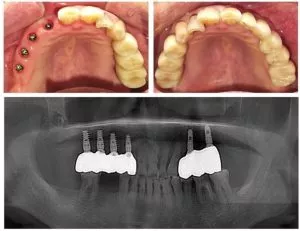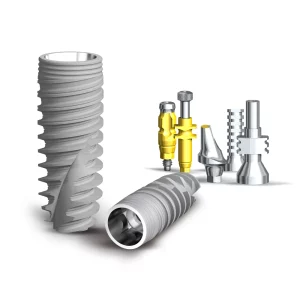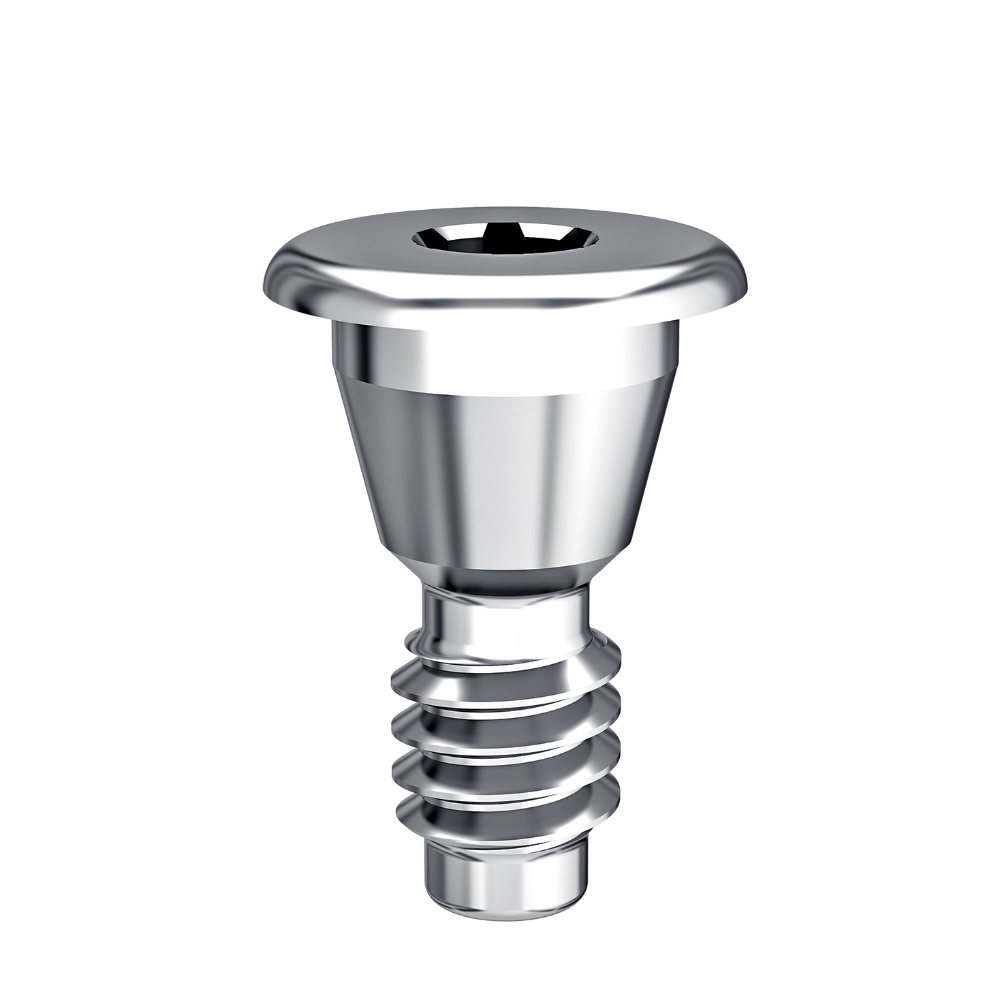
Missing one or even multiple teeth can not only hinder your daily eating and affect clear speech but also diminish the charm of your confident smile. In such cases, dental implants, as an advanced tooth replacement solution, have gained widespread recognition and popularity. According to statistics, over 5 million dental implants are successfully placed by dentists in the United States every year. With exceptional stability and outstanding durability, dental implants are regarded as the closest restoration method to natural teeth, bringing life-changing benefits to countless patients.
So, just how impressive is the strength of dental implants? How do they compare to natural teeth? In the following sections, this article will thoroughly explore the source of dental implant strength, compare them with natural teeth, and examine the various factors that influence implant stability, providing you with a comprehensive and detailed analysis.
Why Are Dental Implants So Strong?
The strength of dental implants comes from their use of high-strength titanium implants, the biological fusion based on the osseointegration principle, and continuous innovations in implant design and technology. These factors work together to make dental implants a restoration method that closely mimics natural teeth, providing patients with a long-term and reliable oral health solution.
High-Strength Titanium Implants:
Titanium is the preferred material for dental implants due to its unique properties. Firstly, titanium offers exceptional biocompatibility, meaning it has minimal risk of rejection by the human body and supports the healthy growth of surrounding tissues. Secondly, its corrosion resistance ensures that the implant remains intact in the complex and changing oral environment without being damaged. Most importantly, titanium’s high strength allows the implant to withstand significant chewing forces without breaking or deforming.
Extensive Medical Recognition:
Due to these outstanding properties, titanium has become widely used in the medical field, especially in dental implantology, serving as a bridge between artificial restoration and natural teeth.
The Principle of Osseointegration:
Another key factor contributing to the strength of dental implants is the principle of osseointegration. This process involves the biological fusion between the implant and the surrounding bone tissue, where the implant surface forms a direct and tight bond with bone cells. This bond is exceptionally strong, providing support similar to a natural tooth root. Over time, the fusion between the implant and the bone tissue becomes even more secure, further enhancing stability.
Advanced Implant Design:
Beyond material selection, the design of the implant itself plays a critical role. Modern dental implants incorporate various advanced design concepts, such as surface treatment techniques like SLA (sandblasted, large grit, acid-etched), which modify the implant’s microstructure to increase the contact area with bone tissue, promoting faster and stronger osseointegration. Additionally, the thread design of the implant is crucial for stability. Precision-engineered threads not only improve mechanical locking with the bone but also guide bone growth during the healing process, further reinforcing the implant’s firmness.
Are dental implants better than real teeth?
1. Chewing Pressure: Natural Teeth vs. Dental Implants
Natural teeth, one of the hardest substances in the human body, can withstand approximately 5,600 pounds (2,540 kg) of pressure. However, tooth loss significantly reduces this biting force. Traditional dentures may lower bite strength to around 50 pounds per square inch (344.7 kPa), which can negatively affect eating ability and oral health.
In comparison, dental implants can restore up to 85% of natural bite force after proper surgical placement and osseointegration. This allows them to endure approximately 50-100 kg of pressure, closely matching natural teeth and enabling patients to enjoy their meals without discomfort.
2. Durability and Longevity of Dental Implants
Natural teeth’s lifespan varies based on factors like oral hygiene and health conditions. However, dental implants offer exceptional durability:
- Lifespan: With proper care, implants can last 10-20 years or even longer.
- Materials: The implant consists of a titanium screw, abutment, and dental crown. Titanium’s strength and biocompatibility make it ideal for long-term use.
- Crown Replacement: While the titanium components can last a lifetime, the crown may require replacement every 10-15 years due to wear.
3. Resistance to Decay: An Advantage Over Natural Teeth
One unique benefit of dental implants is their resistance to cavities. Since the implant screw and abutment are made from titanium, bacteria and tooth decay cannot affect them. This makes dental implants a great solution for those prone to frequent cavities.
However, maintaining good oral hygiene is still essential, as gum disease can impact the surrounding tissues supporting the implant.
Dental implants offer remarkable strength, durability, and decay resistance, making them a highly effective tooth replacement option comparable to natural teeth. With advancements in technology and material science, dental implants have become a reliable, long-term solution, restoring both functionality and confidence for patients worldwide.
How long do dental implants last?
Dental implants, as an advanced tooth restoration technology, are designed to provide patients with a long-lasting and stable solution. While the titanium screw and abutment can theoretically last a lifetime, the dental crown, which is in direct contact with the oral environment, may require periodic replacement due to various factors.
Generally, the dental crown of an implant needs to be replaced every 10 to 15 years. This timeline is not fixed and largely depends on factors such as the patient’s oral hygiene habits, overall oral health, and the extent of crown wear. Maintaining good oral care practices, including regular brushing, flossing, mouth rinsing, and professional dental check-ups, can significantly extend the crown’s lifespan.
Notably, dental implants not only restore the aesthetics and functionality of teeth but also play a positive role in bone stability and growth. Unlike traditional tooth restoration methods, dental implants integrate with the jawbone through a process called osseointegration, effectively preventing bone loss and preserving overall oral health.
While dental implants are one of the most permanent tooth replacement options available, patient cooperation and proper care remain essential for their long-term success. By following a dentist’s guidance, maintaining excellent oral hygiene, and scheduling regular check-ups, patients can maximize the lifespan of their dental implants and enjoy a healthy, confident smile for years to come.
Key Factors Affecting the Strength of Dental Implants
The primary factors influencing the strength of dental implants include implant material and brand, alveolar bone quality and density, the dentist’s skill and experience, postoperative care and oral hygiene, as well as the patient’s lifestyle habits. To ensure the durability and long-term stability of dental implants, patients should choose high-quality implant brands, seek experienced dentists, and maintain good oral hygiene and healthy habits.
1. Implant Material and Brand
Material Choice: The implant material directly affects its strength. Titanium alloy and all-ceramic implants are two common options. Titanium alloy is widely used due to its excellent biocompatibility, strength, and stability, making it suitable for most cases. On the other hand, all-ceramic implants offer superior aesthetics and high biocompatibility, making them popular for front teeth restorations.
Brand Differences: Different implant brands may vary in production techniques, design, connection methods, and precision, all of which can impact implant strength. Therefore, when choosing implants, both material and brand reputation should be considered. DentalMaster, a professional implant manufacturer, provides advanced technology and innovative SLA surface treatment, offering lifetime warranties for their implants.
2. Alveolar Bone Quality and Density
Bone Volume Adequacy: The quality and density of the alveolar bone are crucial for implant stability. When bone volume is sufficient and density is appropriate, the implant can achieve effective osseointegration, providing solid support.
Bone Grafting: For patients with insufficient bone volume, bone grafting procedures may be necessary to enhance bone mass and ensure implant stability. The success of the bone grafting surgery directly impacts the strength of the implant.
3. Dentist’s Skill and Experience
Technical Expertise: The dentist’s skill level plays a decisive role in the success and strength of dental implants. Proper implant placement and secure integration with surrounding tissues are essential for successful healing and long-term stability.
Experience: Experienced dentists are better equipped to handle complex cases and adapt to varying conditions, ensuring optimal implant strength and stability.
4. Postoperative Care and Oral Hygiene
Regular Maintenance: Post-surgery, regular dental cleanings and check-ups are essential to maintain implant health and stability. Proper care includes daily brushing, flossing, and using mouthwash, along with professional dental check-ups.
Avoid Harmful Habits: Patients should avoid chewing hard foods or excessive pressure on the implant to prevent damage.
5. Patient Lifestyle Habits
Smoking: Smoking is a significant risk factor for peri-implantitis and gum disease. Smokers often experience higher inflammation, which can compromise implant stability. Quitting smoking can significantly extend implant lifespan.
Diet: A balanced diet supports oral health, while excessive consumption of sugary and acidic foods can harm both natural teeth and implants. Patients should maintain healthy eating habits to protect their dental implants.
Suitable Candidates for Dental Implants
Dental implants are a common and effective tooth restoration solution suitable for various groups of people. Here are the primary groups who can benefit from dental implants:
- Patients with Missing Teeth
Single Tooth Loss: Dental implants provide a stable foundation for artificial teeth, making them look, feel, and function like natural teeth.
Multiple Tooth Loss: Whether teeth are missing consecutively or in separate areas, dental implants can serve as an effective restoration solution. Multiple implants can restore both chewing function and aesthetic appearance.
Complete Tooth Loss: For patients with full mouth tooth loss, dental implants can offer a comprehensive restoration. By placing a sufficient number of implants, full dentures can be supported, improving chewing efficiency and comfort. - Patients with Healthy Alveolar Bone
Dental implants require healthy alveolar bone to support the implant’s stability. If a patient has sufficient bone volume and density, they are suitable candidates for dental implants.
- Inadequate Bone Volume: If the bone quality is poor, such as low bone density or insufficient bone mass, bone grafting or other procedures may be necessary to improve bone conditions before implant placement.
- Patients Seeking Long-Term Solutions
Dental implants are a durable and reliable tooth restoration method. Compared to traditional dentures or dental bridges, implants offer superior stability and longevity.
- Long-Term Stability: Ideal for those seeking a long-term solution, as dental implants can restore chewing function, enhance aesthetics, and improve quality of life with minimal maintenance.
- Other Suitable Candidates
Congenital Tooth Deficiency: Patients with missing teeth due to congenital anomalies can benefit from dental implants, improving both functionality and appearance.
Allergic to Traditional Dentures or Bridges: Some patients may experience allergic reactions to conventional materials used in dentures or bridges. Dental implants offer a hypoallergenic alternative.
Adults with Good Oral Health: Since dental implants require a fully developed jawbone, they are recommended for healthy adults. Good overall health is also important for successful surgery and recovery.
Important Considerations:
While dental implants are suitable for many individuals, they are not ideal for everyone. A professional dental evaluation is necessary to determine if a patient qualifies for the procedure. Factors such as bone health, general health, and oral hygiene habits play a significant role. Maintaining proper oral care and a healthy lifestyle can further extend the longevity of dental implants.
Conclusion
The strength of dental implants is influenced by multiple factors, including implant materials and brands, alveolar bone quality and density, the dentist’s skills and experience, postoperative care, oral hygiene, and the patient’s lifestyle. These factors work together to determine the stability and longevity of dental implants.
By selecting high-quality implants and reputable brands, choosing an experienced dentist, and maintaining good oral hygiene and healthy lifestyle habits, patients can maximize the strength of their dental implants, achieving a chewing experience close to that of natural teeth. Dental implants not only restore chewing function but also improve oral aesthetics and enhance the patient’s quality of life.
Therefore, for those considering dental implants, it is highly recommended to consult a professional dentist for a comprehensive oral examination and evaluation. The dentist will develop a personalized treatment plan based on the patient’s specific needs, ensuring surgical success and implant durability. Additionally, patients should actively follow their dentist’s guidance, maintain proper postoperative care, and schedule regular check-ups to prolong the lifespan of the implants and protect oral health.
In summary, dental implants are an effective and reliable tooth restoration solution that can provide long-term benefits. With proper care and the right choice of implants, patients can enjoy a chewing experience similar to natural teeth, along with a healthy and beautiful smile.









